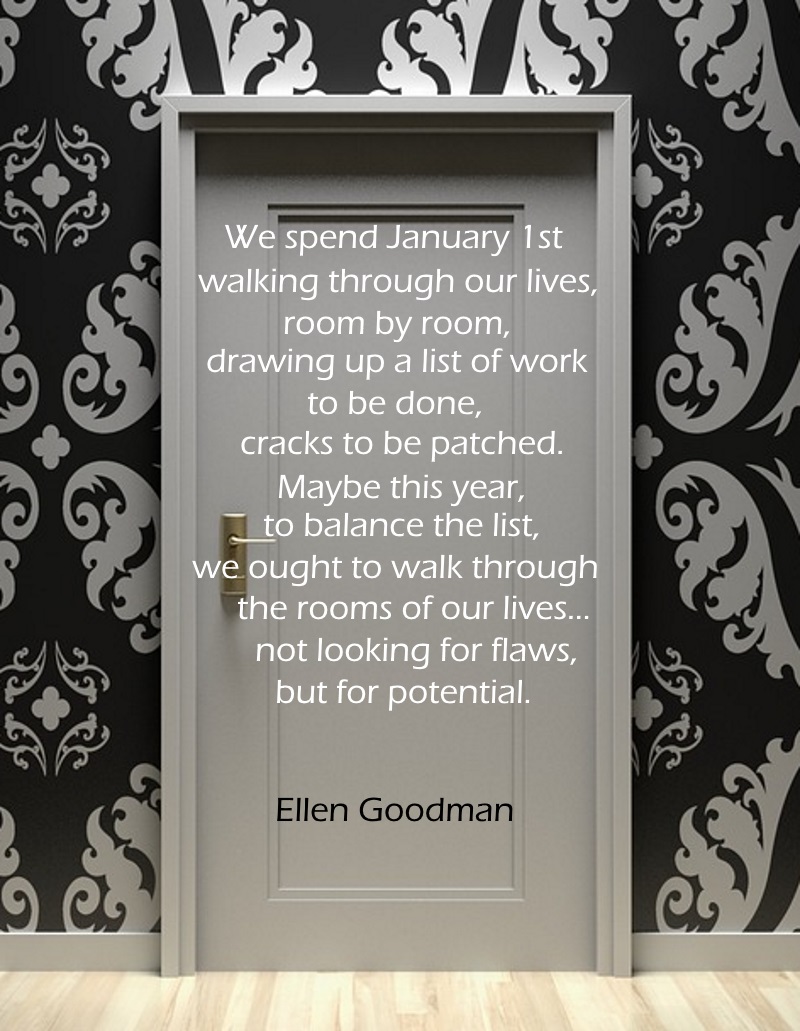
For the past few (several) years now, I’ve made resolutions. “This is it,” I’ll say to myself. “This is the year I lose a few pounds, exercise more, get everything my heart desires, and become more enlightened. I’m also going to make it my goal to worry less and have more fun. This is my year.”
“Famous last words,” says a voice in my head that sounds suspiciously like Clint Eastwood in Unforgiven.
It will work for a while. I’ll stick to my new exercise and eating plan, I’ll start reading self-help books, meditate…but just like one of those standoffs in old Westerns, when high noon strikes in mid-March, I know I’ve lost the battle. The “exercising every day” plan starts to sputter out. The fruits become a chocolate muffin (“How did that get in my hand?”), and I’m staring at the ceiling at night wondering, as I always do, what the future will bring.
“There’s always next year,” I reassure myself…again.
So why do so many resolutions lose momentum by springtime? Partly because people make resolutions in a short-lived, champagne-induced enthusiasm, but mostly because they are not ready to put in the effort to change, and that can be traced back to one crucial factor: We are less motivated to achieve goals that are not meaningful to us. The solution? Use the aspects of your life you are least satisfied with as an impetus for change.
We analyzed data from 1,123 who took our Life Satisfaction Test on Queendom, focusing on two diverse groups: People who are completely satisfied with their life and those who are not. This brought to light life factors that have the strongest influence on happiness and contentment, which could be a good starting point for creating your resolutions for 2019.
The following is a list of the sixteen factors covered in our study, arranged from largest to smallest differences. The larger the difference between groups, the greater influence this factor has on life satisfaction. (Note: Scores on the factors range from 0 to 100).

Psychological well-being: Assesses the degree to which a person is content with his or her mental health and possesses a healthy state of mind.
- Score for satisfied group: 85
- Score for dissatisfied group: 32
Sense of accomplishment: Assesses the degree to which a person is content with his or her personal, educational, and job-related achievements thus far.
- Score for satisfied group: 80
- Score for dissatisfied group: 27
Sense of purpose/meaning: Assesses the degree to which a person has a profound aspiration or goal to strive for. Meaningful goals can boost life satisfaction.
- Score for satisfied group: 45
- Score for dissatisfied group: 92
Satisfaction with field: Assesses the degree to which a person is happy with the job field he or she has chosen to pursue.
- Score for satisfied group: 79
- Score for dissatisfied group: 34
Satisfaction with family: Assesses the degree to which a person is satisfied with his or her close relationships.
- Score for satisfied group: 83
- Score for dissatisfied group: 39
Sense of belonging: Assesses the degree to which a person feels connected to the people in his or her life.
- Score for satisfied group: 75
- Score for dissatisfied group: 31
Satisfaction with work conditions: Assesses the degree to which a person is satisfied with his or her job environment, which comprises factors like social atmosphere, workload, salary, and morale.
- Score for satisfied group: 78
- Score for dissatisfied group: 35
Satisfaction with friends: Assesses the degree to which a person finds joy in his or her friendships.
- Score for satisfied group: 84
- Score for dissatisfied group: 44

Satisfaction with romantic life: Assesses the degree to which a person is happy with his or her personal relationship and has found a loving partner.
- Score for satisfied group: 66
- Score for dissatisfied group: 29
Satisfaction with boss: Assesses the degree to which a person is satisfied with his or her relationship with his/her boss, and thrives under this individual’s management style.
- Score for satisfied group: 77
- Score for dissatisfied group: 41
Satisfaction with body image: Assesses the degree to which a person takes pride in and loves his or her appearance.
- Score for satisfied group: 69
- Score for dissatisfied group: 34
Sense of pleasure: Assesses the degree to which a person feels his or her life is enjoyable and actively takes steps to bring more fun into his/her life.
- Score for satisfied group: 77
- Score for dissatisfied group: 44
Satisfaction with colleagues: Assesses the degree to which a person is satisfied with his or her work relationships and experiences a sense of camaraderie with colleagues.
- Score for satisfied group: 73
- Score for dissatisfied group: 41
Sense of freedom: Assesses the degree to which a person is satisfied with his or her work relationships and experiences a sense of camaraderie with colleagues.
- Score for satisfied group: 73
- Score for dissatisfied group: 43
Financial health: Assesses the degree to which a person is satisfied with the state of his or her finances.
- Score for satisfied group: 59
- Score for dissatisfied group: 31
Physical well-being: Assesses the degree to which a person is content with his or her state of health.
- Score for satisfied group: 69
- Score for dissatisfied group: 49

The crucial question now is: How will you know when you are ready to change? The answer is that you will feel it. No matter how big the goal may seem to you, there will still be a burning desire in you to make it happen. You will be keen to get started, to do whatever you can to achieve it, and to push yourself through any obstacles that get in the way. You will not let failure deter you. If you don’t feel that drive and intensity, then it’s either not the right resolution for you or you’re just not ready to change yet. Moreover, what this study has shown is that there are certain factors that are more likely to have a greater impact on your happiness, factors like psychological well-being, goals to strive for, and a sense of achievement.
Remember, it’s really easy to focus on the aspects of your life that you’re unhappy with; it’s much harder to take the necessary steps to improve them. This doesn’t mean that you should aim to make sweeping changes in all the areas of your life; that’s too much to take on and you’ll be more likely to give up. Take a critical look at your life. Pick one or two areas that you want to improve the most and then set out a plan with concrete steps to do so. Write out each step and the resources or information you will need. Prepare “wobble strategies” – figure out how you will identify triggers that cause you to slip back into old habits, and what will you do to prevent that from happening. Enlist the help of friends, family, an online support group, a therapist, or a life coach to keep your on track.
It’s time, my friend. This is your year.

Insightfully yours,
Queen D

